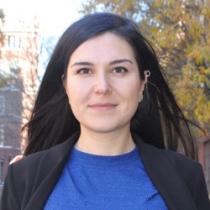
Gokcin Cinar
What is your next adventure?
I will be taking a research engineer position in the Aerospace Systems Design Lab (ASDL) where I've spent the last six years. It feels like home because I have been taken such good care of. As a RE, I have lots of sponsored projects on hybrid electric vehicles that I'm working on for Boeing, NASA, the Air Force Research Lab. My work will focus on subsystems integration, sizing, and synthesis.
What about your next adventure are you most looking forward to?
Let's do the math on this: for the first time in 22 years I am not a student. That is exciting for me. I will still be a student, however, because there is always so much to learn. But now I get to learn it in a very different environment - as a working engineer.
Did you have any previous co-op, internship, or research experience in this area?
It's the internships and the research that made the difference for me. When I first got to Tech, all of my schooling was in theoretical and abstract concepts. I was amazed how much I learned working on real-world applications. This is how I developed my research interest in hybrid electric vehicles.
I did one internship at a German company called PACE Aerospace Industries that produces an aircraft system and subsystem sizing software that we've used at ASDL. I contributed to the software development and developed physics-based models.
Research-wise, I worked on a number of different projects. My first was NASA's Environmentally Responsible Aviation (ERA) where I worked with a team that did fleet-level analysis of aircraft noise and emissions. I also worked with NASA on an electric motor project. And I worked with the AFRL on the development of a thermal management system for hybrid electric aircraft.
None of these things were even in my head when I came to Tech. I learned all about these applications and the role I could play in developing new applications when I came to ASDL.
How did your educational experience at Georgia Tech help you to achieve your goals?
The most prominent thing has to be solving real-world problems. When you solve a problem it gives you awhole new power and perspective on the theory you learned as an undergraduate. You study engineering, yes, but you don't know how to apply those theories until you have a problem to solve.
Once you get a taste of that kind of learning, your eyes open. You realize that you have the toolset and that you are developing the skills to apply it. That gives you so much satisfaction, even when the problems are really difficult.
The other thing is, Dr. Mavris has been a role model from day one. There are so many projects to choose from, and he gives you the freedom to choose, but he also let me switch gears so I could pursue the projects that I loved. And that's an important thing for a Ph.D. student because the work, the research, is very hard. If you do not love what you are studying, you will not be successful. Dr. Mavris gives that freedom to every single student, and it matters a lot.
What advice would you give to an underclassman who would like to follow the same path?
Don't expect to be spoon-fed. If you want something, you need to be asking for it because there are so many grad students hungry for the same level of attention and opportunity. You cannot hide and wait for someone to discover your ability to contribute. You need to show your willingness to work hard and produce.
It's easy to be intimidated, but a mistake to let that define you. As an international student, I was afraid of getting lost because there are a lot of smart people here. So I went to Dr. Mavris and I said "We have a lot of projects, and a lot of sponsors, and I want to know how I can best contribute to them and to the lab." That visit made me visible to Dr, Mavris and to others who are running the lab. He knew I was serious about contributing. And once I started working on projects, he also saw that I was someone that other students could come to, to ask questions about my research. That made me feel like I was part of the lab. It also helped the lab with its mission.